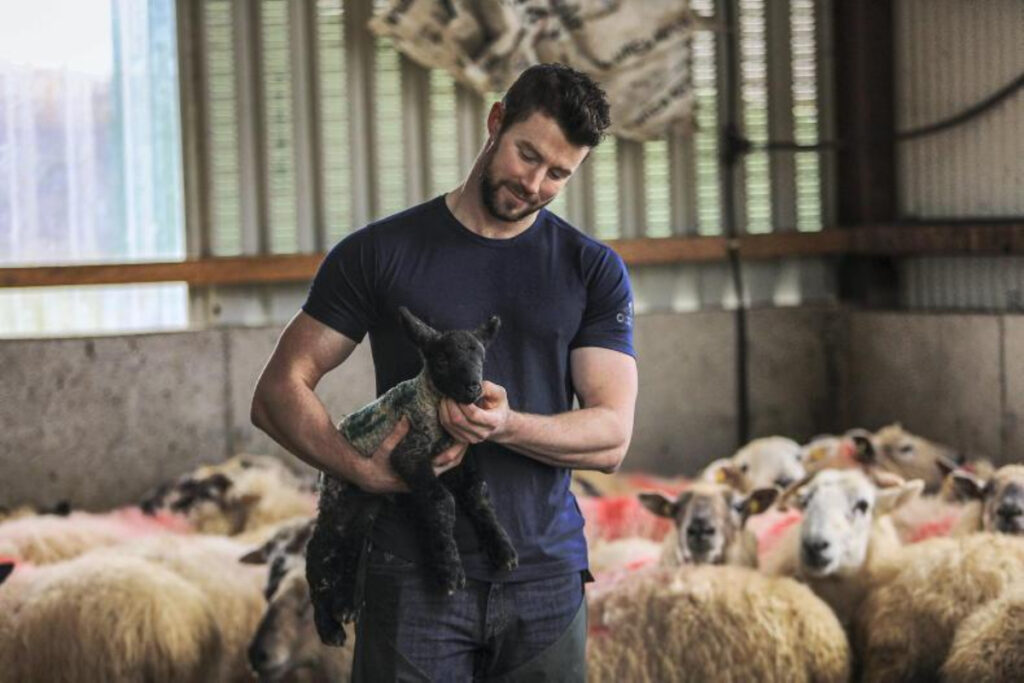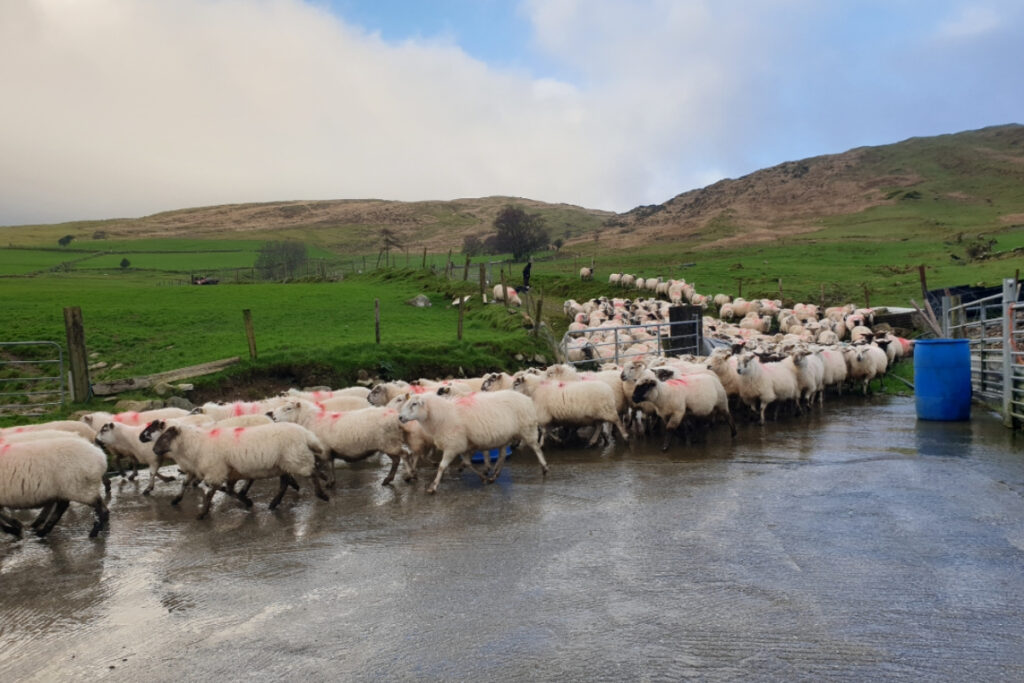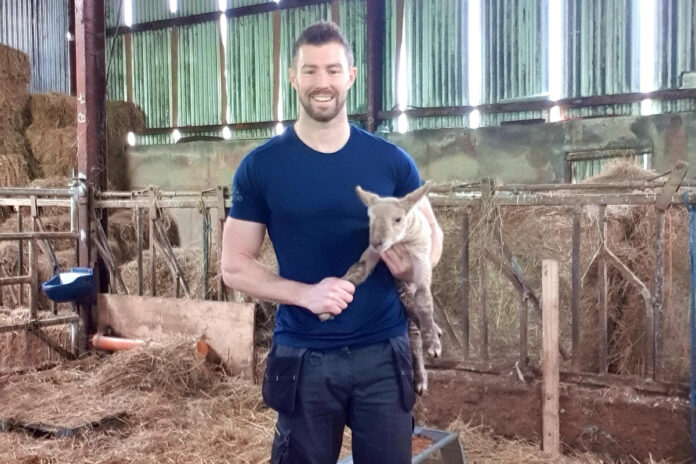In this week’s sheep farming segment, That’s Farming editor, Catherina Cunnane, speaks to Kerry native, Glyn Egan.
“I am 31-year-old Glyn Egan from Kilgarvan, Co. Kerry. I was born into the family farm in Kilgarvan, and so was my father and his mother before him. I am the fifth generation to farm.
My father won the Munster suckler farmer of the year award title back in 1987 and came second in Ireland overall. It was the very first year of the awards. He had a 40 strong herd back then, and together, we run a suckler herd and sheep flock.

Kerry sheep farmer
I am a full-time farmer, but also a carpenter by trade, so I work in carpentry jobs during quieter farming periods and was previously in Australia.
In total, we farm 750 ewes, 200 ewe lambs, 24 rams and 2 suckler cows across 720-acres.
Firstly, we have 550 Texel/Suffolk/Belclare/Cheviot-crosses and 200 Scottish Blackface. We chose the Scottish blackface because of its resilience to conditions such as weather. They are also great mothers to their lambs.
Also, we cross Texels with these ewes and keep the first cross; this brings hardiness from the scotch and also brings great finishing ability from the Texel. We keep these ewes in lower hills that my father has improved over the years.
Furthermore, we cross all these ewes with Suffolk rams. We sell some as store lambs and send others to the factory.
In essence, we have built up the flock over the years by keeping our own replacements. We keep 150 yearly, but this year, we kept 200 as we are trying to increase numbers.
We have a strict protocol when it comes to choosing replacements. They have to be a certain weight, have good length, feet and good mouths also.

March lambing
Lambing takes place from St. Patrick’s Day onwards. We mainly operate an indoor lambing system, but the Scotch breed is more resilient to extreme weather conditions. Therefore, we lamb some of these outdoors when we have capacity constraints in the sheep shed.
The main reason for March lambing is to optimise grass growth on our land. Our land is elevated, so grass growth is slower than in lower-lying areas.
We have used teaser tumps for the last two years, where we introduce a teaser ram 14 days before the fertile rams went to ewes. As a result, most ewes have lambed within 20 days. We have found this to be very good as other years it dragged on for too long.
Furthermore, we inspect all our lambs when we take them away from ewes to dry off. We weigh the heaviest ram lambs, and anything over 38kgs goes into a separate group to the lighter ram lambs.
We send the heavier ones to the factory after a few weeks on grass, and the lighter ones go to Kenmare Mart over the following two months. They get some meal when grass is getting scarce because it is needed for the next mating season.
We keep our own ewe lambs every year. Overall, we try to keep the best lambs in the flock, and sell the rest to farmers or a nearby Kenmare Mart.
We strive to breed good quality lambs that finish quickly off grass. This is why we choose Suffolk as our terminal sire to cross with our ewes.
They finish quickly, and there is a good market for ewe lambs also. We try to get 5-star rams, if possible. However, he can have all the stars in the world, but if he does not have good length and size, he is not for us.

The great outdoors
Being outdoors in the fresh air amongst nature at its finest is the most enjoyable element of sheep farming.
There is nothing better than a fine spring day when lambing is underway, and things are going your way. It puts a big smile on your face and spring in your step.
The most challenging time is lambing season. It brings long hours and often bad, cold weather, which can slow grass growth. This results in housing animals longer, which confines space and increases cost.

Ovine genetics and grassland
Overall, I am most passionate about sheep breeding – breeding good quality ewe lambs and improving the flock. If you do not put good quality ewes back into your flock, you are wasting your time.
Improving poor grassland areas in the mountain also is another aspect that I take pride in. My father has been at this for years, and I have continued this tradition. It is locally known as John Egan’s Green Mountain.
In general, my responsibilities on the farm include end to end farm management, ensuring that everything runs smoothly.
To be a good sheep farmer, you have to have a love for it. Otherwise, you are wasting your time. You get out of it what you put in. Also, you need to understand that there will be tough days, but the good days outdo the bad.
It is important to strive to build up or improve your flock slowly; do not rush things. As things can go wrong quickly, seek advice from the right people and know when to ask for help. Be willing to spend and buy from reliable farmers.
As a sheep breeder, my highlight to date has been the price of lambs in 2021. Hopefully, it will continue as fertiliser and feeds costs have increased significantly.
You have to have a genuine interest and enjoy working with sheep. Do your homework and get advice from the right people who have experience.
Be willing to spend if you want to establish your flock and grow it right. Having correct housing, fencing and penning facilities all cost money. However, if you have a keen interest, stick to it and do it right.

Expansion
In five years, I hope to increase the flock from 750 to 950 – 1,000 ewes and have pedigree sheep on the farm. There is something about the Blueface Leicester I like, and I would love to be breeding my own mules.
Sheep farming is viable to an extent. To make a living out of it, you would need to be getting good direct payments, have big numbers, and own the land, in my opinion.
It needs to be well managed and have a good return, i.e. rearing as many lambs as possible and managing costs right.
There are a lot of hidden costs associated with farming, and as we saw in the past few months, fertiliser, feed and diesel costs etc., have all skyrocketed.
Despite all this, my ultimate goal is to be running a successful business and provide well for my family.
I think the future of sheep farming is positive. Lamb prices are good at the moment, and I understand that demand is expected to exceed supply over the coming years.

Reflection
My journey so far has been great, and I love it. I am learning new things every day, and no day is the same. My father is a great help, and as he says himself, “a farmer never retires”.
He always looks after the place when I am away.
I lived in Sydney for five years and worked as a carpenter, but I have been home for three years now. All focus is on the farm now to run a successful business.
Finally, if I were to give advice to anyone, it would be to keep good records, My father has kept a diary every year since 1968, and I have done the same since I started farming.
It keeps the mind at ease, and all the details/records from previous years are there, so there is no confusion with the coming year to go off.
Also, it reminds you of what you need be to do but to avoid making the same mistake twice. We find it great, and it is our go-to book,” the Kerry sheep farmer concluded.
See more sheep farming profiles.
To share your story like this Kerry sheep farmer, email – [email protected]





